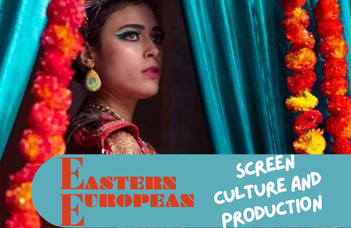Eastern European Screen Cultures and Production

Course summary
The course explores Eastern European screen cultures and moving image productions, focusing on streaming platforms, runaway productions, and emerging television forms.
It examines the interplay between global cultural and industrial forces and regional productions, analyzing global, regional, and local production cultures. Key concepts include post-socialism, post-colonialism, platform imperialism, and liminal whiteness. By completing the course, students will gain insights into television's impact on cultural politics and economic dynamics in Eastern Europe, comprehend streaming platform operations, and apply cultural studies and media theory to analyze visual narratives.
Course period and venue
21 July- 03 August
Venue: ELTE Faculty of Humanities, Múzeum körút 6-8.
Credits
Our course recommends 5 ECTS points, which may be accepted for credit transfer by the participants' home universities. Those who wish to obtain these credits should inquire about the possible transfer at their home institution prior to their enrollment. The International Strategy Office will send a transcript to those who have fulfilled all the necessary course requirements and request one.
Application deadline
30 May 2025 (max. 15- 20 participants)
Course fee
590 EUR; includes: tuition fee, course materials, meals (coffee break and lunch), local transport, opening ceremony and the cost of the leisure time programs, excursions
Course requirements
At least level B2 (CEFR) English proficiency
Application
Application form: https://www.elte.hu/en/content/.f.677
Meet the lecturers

Dr. Veronika Hermann
Assistant Professor
Eötvös Lorand University, Budapest, Hungary
Hermann.veronika@btk.elte.hu
Veronika Hermann is Assistant Professor in the Department of Media and Communication at Eötvös Loránd University, Budapest, where she obtained her PhD in Literary and Cultural Studies in 2015. Her research interest covers Cold War popular culture, contemporary and 20th-century Eastern European popular culture, and relations of socialism, nationalism, whiteness, and post-colonialism. She has publications and she lectures in Hungarian and English. Her first book Identity Politics in Literature was published in 2020. In 2024 she was a Visegrad Scholarship Fellow at Central European University - Open Society Archives with an ongoing research project called Nationalism Revisited.
Course Syllabus
Schedule:
Week 1
22 July
9.00- 10.30 What is Eastern Europe in popular culture?
11.00-12.30 East-West relations during the Cold War
13.30- 15.00 Cold War and popular / consumer culture
24 July
9.00- 10.30 TV Socialism: television genres and transnationalism
11.00-12.30 Transition in transition: representations of 1989
Watch: Good Bye Lenin (dir. Wolfgang Becker, 2003)
13.30- 15.00 Representations of the wild 1990s in Eastern European film cultures
Watch: Bolse vita (dir. Ibolya Fekete, 1996)
25 July
9.00- 10.30 Post-socialism and post-colonialism in Eastern European screens
Watch: Larry (Bernáth Szilárd, 2022)
11.00-12.30 White, but not quite: liminal whiteness in Eastern European screens
13.30- 15.00 First week final discussion / group project
Week 2
29 July
A guided tour at the Korda Film Park at the outskirts of Budapest, details will be discussed during the first class.
31 July
9.00- 10.30 Streaming Eastern Europe in global screens
11.00-12.30 Streaming Illiberalism and Popular Content
13.30- 15.00 Streaming history: historical content production and nationalism
Watch: Rise of the Raven (2024)
1 August
9.00- 10.30 Final group presentations 1.
11.00-12.30 Final group presentations 2.
13.30- 15.00 Final group presentations 3.
